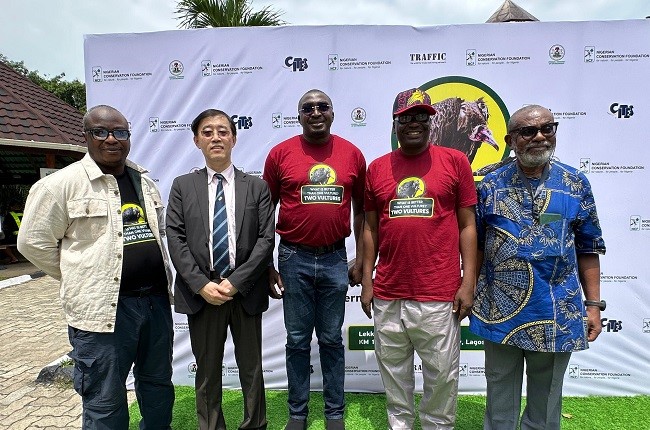In order to address the decline in the population of vultures in Nigeria, the Federal Ministry of Environment in conjunction with the Nigerian Conservation Foundation (NCF) has developed National Vulture Conservation Action Plan (NVCAP) – a national framework aimed at reversing the trend through coordinated policy, research and community-based action.

Dr. Moses Ama, Director of Forestry, Federal Department of Forestry, who made this known on Tuesday, July 1, 2025, in Lagos at the two-day workshop on “Reducing the Demand for Vultures in Traditional Medicine Practices In Nigeria”, noted that the vulture – the nature’s most vital scavengers – is now at the brink of extinction, primarily due to belief-based use in traditional medicine, poisoning, and illegal trade.
Speaking through Bosede Olukanni, Deputy Director, Federal Department of Forestry, Federal Ministry of Environment, Dr. Ama noted: “Nigeria is blessed with a rich array of wildlife species, each contributing to the delicate ecological balance that sustains life. Among these, vultures hold a unique and irreplaceable role as nature’s clean-up agents, preventing the spread of deadly diseases through the efficient disposal of animal carcasses.”
According to him, “Six of our vulture species are listed as Critically Endangered by International Union for Conservation of Nature (IUCN), including the Hooded Vulture and White-backed Vulture. This disturbing trend not only threatens biodiversity but poses serious public health risks and undermines our international conservation commitments.
Part of what NVCAP stands to address according to the Director of Forestry is “creation of nationwide awareness in form of education, and sensitisation campaigns, strengthening the legal and regulatory framework – once enacted, the Endangered Species Protection and Conservation Bill 2024 will provide tougher penalties and modern tools to combat wildlife crimes, including the illegal vulture trade as well as multi-stakeholder collaboration in form of partnerships with law enforcement agencies, NGOs, traditional institutions, and international bodies which have been scaled up to ensure a whole-of-society approach to this challenge,” he stated.
In his welcome address, Dr. Joseph Onoja, Director-General, NCF, noted that human beings are at the top of the pyramid of the ecosystem.
He said: “All of these things that nature has provided is for our benefit at the end of the day. There is need for us to protect the ecosystem from collapsing, if that ecosystem collapses, because we are at the top, our fall will be higher and it will be more painful. That is why we need to be concerned about what is happening to our species, especially the vultures.”
Prof. Augustine Ezealor, in his paper presentation titled “More Than Scavengers: The Impact of Vultures on Ecosystems and Public Health”, disclosed that vultures are more than scavengers. According to him, there are only 23 species of vultures worldwide, 11 in Africa and 7 in Nigeria, hence the need to religiously protect them and prevent them from going into extinction.
Ezealor, who is a Professor of Ornithology, highlighted some of the services provided by vultures to include: “Sanitation and Disease Pest and Vermin Reduction, Cultural and Spiritual Symbolism, Environmental Nutrient Cycling, Traditional Medicine among others”
Key threats for vultures, according to Ezealor, are “Hunting for Food, Unregulated Use in Traditional Medicine. Poisoning, Cultural Charge and Poverty Driven Exploitation and Nest Destruction (during construction and urbanization).
In his remarks, Alhaji Shaba Maikudi, National President, National Association of Nigeria Traditional Medicine Practitioners (NANTMP), commended NCF for the vision and commitment in bringing traditional medical practitioners together to discuss the issue which, according to him, is both timely and vital to the barriers of the use of land and the use of animal structures, at least in health care conservation and cultural preservation.
He opined that the gathering is not just a workshop, but also a confirmation to the fact that traditional medicine is not obsolete but is a pillar of sustainable health care and potential solutions to the global medical and ecological challenges in our roots and the state-wide environment at the grassroots level.
“As traditional medical practitioners, we believe we cannot do that without a solution, we must work hand-in-hand with the policy makers, researchers, conservation and international bodies to create a sustainable ecosystem for traditional medicine to thrive,” he submitted.
The workshop also witnessed presentation from Yuan Liu, representative from Convention on International Trade in Endangered Species of Wild Fauna and Flora (CITES) who presented a paper on “History of Demand Reduction and the Role of the CITES Guidelines in the Protection of Threatened Species”.
By Ajibola Adedoye
